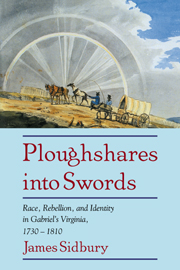Book contents
- Frontmatter
- Contents
- Acknowledgments
- Introduction
- Prologue: From Blacks in Virginia to Black Virginians
- 1 The emergence of racial consciousness in eighteenth-century Virginia
- Part I Cultural process: Creolization, appropriation, and collective identity in Gabriel's Virginia
- Part II Social practice: Urbanization, commercialization, and identity in the daily life of Gabriel's Richmond
- Epilogue: Gabriel and Richmond in historical and fictional time
- 8 Gabriel's Conspiracy in memory and fiction
- Appendix: Richmond households in 1784 and 1810
- Index
8 - Gabriel's Conspiracy in memory and fiction
Published online by Cambridge University Press: 04 August 2010
- Frontmatter
- Contents
- Acknowledgments
- Introduction
- Prologue: From Blacks in Virginia to Black Virginians
- 1 The emergence of racial consciousness in eighteenth-century Virginia
- Part I Cultural process: Creolization, appropriation, and collective identity in Gabriel's Virginia
- Part II Social practice: Urbanization, commercialization, and identity in the daily life of Gabriel's Richmond
- Epilogue: Gabriel and Richmond in historical and fictional time
- 8 Gabriel's Conspiracy in memory and fiction
- Appendix: Richmond households in 1784 and 1810
- Index
Summary
The period bounded by the American Revolution and the War of 1812 has long been portrayed as a high point in the history of White Virginians. During those decades, Virginians led Britain's thirteen mainland colonies into political independence, and, with a short Adams interlude, members of the fabled “Virginia Dynasty” presided over the new nation's government. The term “Jeffersonian Virginia” has come to signify an almost golden age of intellectual statesmen and “rational” politics. If few historians now writing about Jeffersonian Virginia would subscribe to this image, much modern historical writing is infused with a palpable conviction of the power of the stereotype and the importance of qualifying or discrediting it. Both the advocates of Jeffersonian mythology and its debunkers tend, however, to focus almost exclusively on the actions and beliefs of elites, even when criticizing those elites' own lack of concern for the enslaved.
Nineteenth-century African American writers and speakers developed a critique of Jefferson and the Founding Fathers that was more attuned to the meanings of the age for enslaved Blacks. One might logically suspect that the age that appeared golden from White Virginians' perspectives would have taken on a distinctly different hue for Black analysts. Such was in some ways the case, though condemnations of Jeffersonian hypocrisy voiced by African Americans were frequently interlaced with attempts to claim the authority of the Founding Fathers' ideas in the struggle for racial equality. Nonetheless, in much of the public rhetoric of Black and White abolitionists, as well as that of other Americans, the spirit of Jefferson reigned over early republican Virginia, indeed over the early republican United States.
- Type
- Chapter
- Information
- Ploughshares into SwordsRace, Rebellion, and Identity in Gabriel's Virginia, 1730–1810, pp. 256 - 276Publisher: Cambridge University PressPrint publication year: 1997



